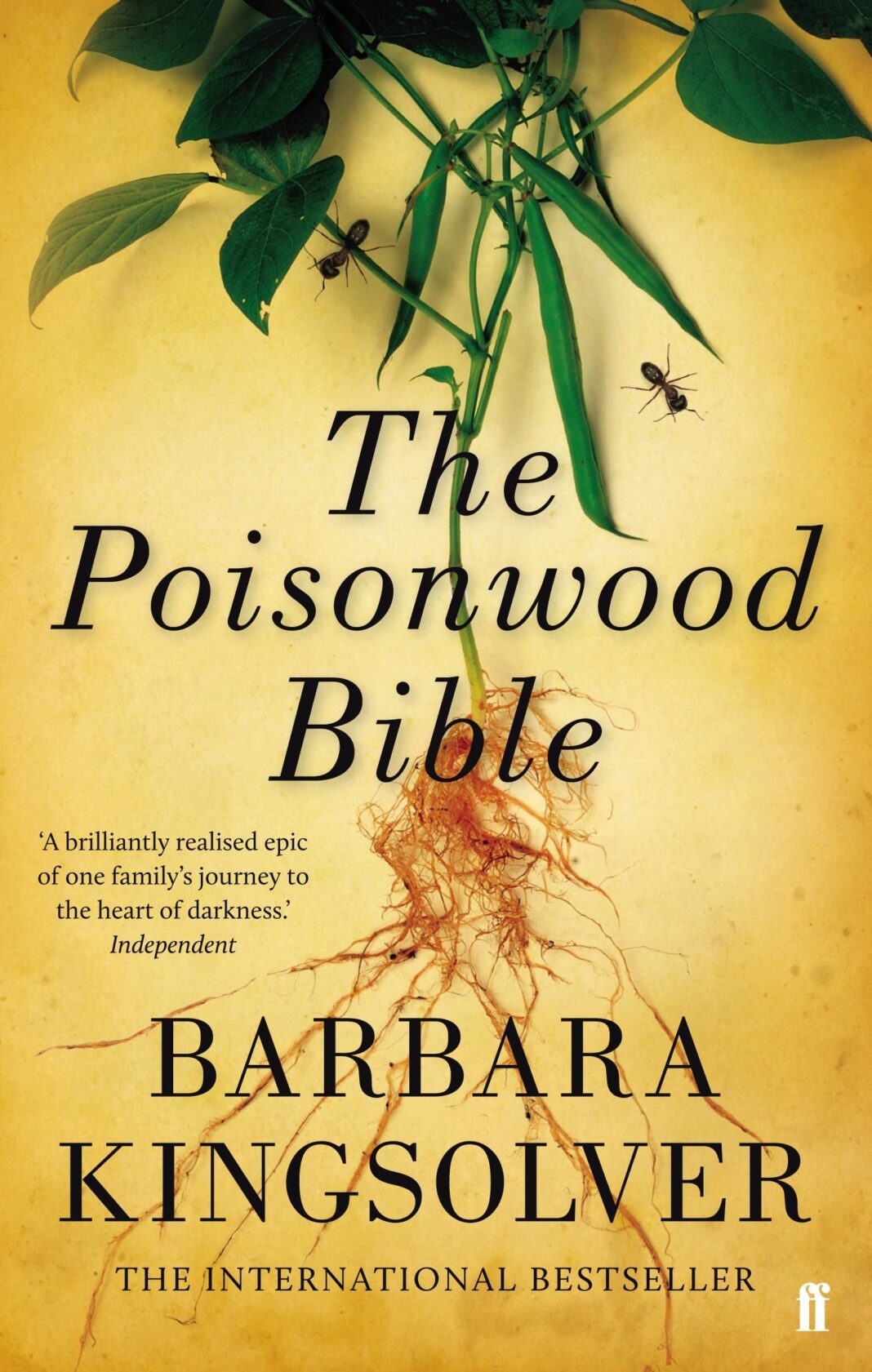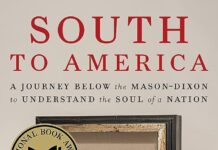Father feels makeup and nail polish are warning signals of prostitution, the same as pierced ears.
Father surveyed our despair as if he’d expected it all along, and left it up to wife and daughters to sort out, suggesting only that we consider the lilies of the field, which have no need of a hand mirror or aspirin tablets. ‘I reckon the lilies need Bibles, though, and his darn old latrine spade,’ Rachel muttered, as her beloved toiletry items got pitched out of the suitcase one by one. Rachel never does grasp scripture all that well.
I could never work out whether we were to view religion as a life-insurance policy or a life sentence. I can understand a wrathful God who’d just as soon dangle us all from a hook. And I can understand a tender, unprejudiced Jesus. But I could never quite feature the two of them living in the same house. You wind up walking on eggshells, never knowing which Tata Nzolo is home at the moment.
There is no stepping in the same river twice. So say the Greek philosophers, and the crocodiles make sure.
Hunger of the body is altogether different from the shallow, daily hunger of the belly. Those who have known this kind of hunger cannot entirely love, ever again, those who have not.
The death of something living is the price of our own survival, and we pay it again and again. We have no choice. It is the one solemn promise every life on earth is born and bound to
The death of something living is the price of our own survival, and we pay it again and again. We have no choice. It is the one solemn promise every life on earth is born and bound to keep. Leah I KILLED MY FIRST GAME, a beautiful tawny beast with curved horns and a black diagonal stripe across his flank: a young male impala.
The death of something living is the price of our own survival, and we pay it again and again. We have no choice. It is the one solemn promise every life on earth is born and bound to keep.
But his kind will always lose in the end. I know this, and now I know why. Whether it’s wife or nation they occupy, their mistake is the same: they stand still, and their stake moves underneath them.
Chains rattle, rivers roll, animals startle and bolt, forests inspire and expand, babies stretch open-mouthed from the womb, new seedlings arch their necks and creep forward into the light. Even a language won’t stand still. A territory is only possessed for a moment in time. They stake everything on that moment, posing for photographs while planting the flag, casting themselves in bronze. Washington crossing the Delaware. The capture of Okinawa. They’re desperate to hang on. But they can’t. Even before the flagpole begins to peel and splinter, the ground underneath arches and slides forward into its own new destiny. It may bear the marks of boots on its back, but those marks become the possessions of the land. What does Okinawa remember of its fall? Forbidden to make engines of war, Japan made automobiles instead, and won the world. It all moves on. The great Delaware rolls on, while Mr Washington himself is no longer even what you’d call good compost.
When I get out of bed every morning, at least I’m still alive and not dead like Ruth May. So I must have done something right. Sometimes you just have to save your neck and work out the details later. Like that little book said: Stick out your elbows, pick up your feet, and float along with the crowd! The last thing you want to do is get trampled to death.
You can’t just sashay into the jungle aiming to change it all over to the Christian style, without expecting the jungle to change you right back. Oh, I see it time and again with the gentlemen who come through here on business. Some fellow thinks he’s going to be the master of Africa and winds up with his nice European-tailored suit rumpled in a corner and his wits half cracked from the filaires itching under his skin. If it was as easy as they thought it was going to be, why, they’d be done by now, and Africa would look just like America with more palm trees. Instead, most of it still looks exactly how it did a zillion years ago.
The way I see Africa, you don’t have to like it but you sure have to admit it’s out there. You have your way of thinking and it has its, and never the train ye shall meet! You just don’t let it influence your mind. If there’s ugly things going on out there, well, you put a good stout lock on your door and check it twice before you go to sleep. You focus on getting your own one little place set up perfect, as I have done, and you’ll see. Other people’s worries do not necessarily have to drag you down.
I teach classes in nutrition, sanitation, and soybeans, to women who respectfully call me Mama Ngemba and ignore nine-tenths of what I tell them. Our hardest task is teaching people to count on a future: to plant citrus trees, and compost their wastes for fertilizer. This confused me at first. Why should anyone resist something so obvious as planting a fruit tree or improving the soil? But for those who’ve lived as refugees longer than memory, learning to believe in the nutrient cycle requires something close to a religious conversion. I ought to understand. I’ve been as transient in my adult life as anyone in our cooperative. And only now, after working this same land for ten years, am I coming to understand the length and breadth of outsiders’ failure to impose themselves on Africa. This is not Brussels or Moscow or Macon, Georgia. This is famine or flood. You can’t teach a thing until you’ve learned that. The tropics will intoxicate you with the sweetness of frangipani flowers and lay you down with the sting of a viper, with hardly room to breathe in between. It’s a great shock to souls gently reared in
Our hardest task is teaching people to count on a future: to plant citrus trees, and compost their wastes for fertilizer. This confused me at first. Why should anyone resist something so obvious as planting a fruit tree or improving the soil? But for those who’ve lived as refugees longer than memory, learning to believe in the nutrient cycle requires something close to a religious conversion. I ought to understand. I’ve been as transient in my adult life as anyone in our cooperative. And only now, after working this same land for ten years, am I coming to understand the length and breadth of outsiders’ failure to impose themselves on Africa. This is not Brussels or Moscow or Macon, Georgia. This is famine or flood. You can’t teach a thing until you’ve learned that. The tropics will intoxicate you with the sweetness of frangipani flowers and lay you down with the sting of a viper, with hardly room to breathe in between. It’s a great shock to souls gently reared in places of moderate clime, hope, and dread.
A jungle yields no abundance to feed the multitudes, and supports no leisure class. The soils are fragile red laterite and the rain is savage.
The loss of a life: unwelcome. Immoral? I don’t know. Depends perhaps on where you are, and what sort of death. Hereabouts, where we sit among such piles of leftover protein we press it into cakes for the pets, who usefully guard our empty chairs; here where we pay soothsayers and acrobats to help lose our weight, then yes, for a child to die from hunger is immoral. But this is just one place. I’m afraid I have seen a world.
In the world, the carrying capacity for humans is limited. History holds all things in the balance, including large hopes and short lives. When Albert Schweitzer walked into the jungle, bless his heart, he carried antibacterials and a potent, altogether new conviction that no one should die young. He meant to save every child, thinking Africa would then learn how to have fewer children. But when families have spent a million years making nine in the hope of saving one, they cannot stop making nine. Culture is a slingshot moved by the force of its past.
For every life saved by vaccination or food relief, one is lost to starvation or war. Poor Africa. No other continent has endured such an unspeakably bizarre combination of foreign thievery and foreign goodwill.




